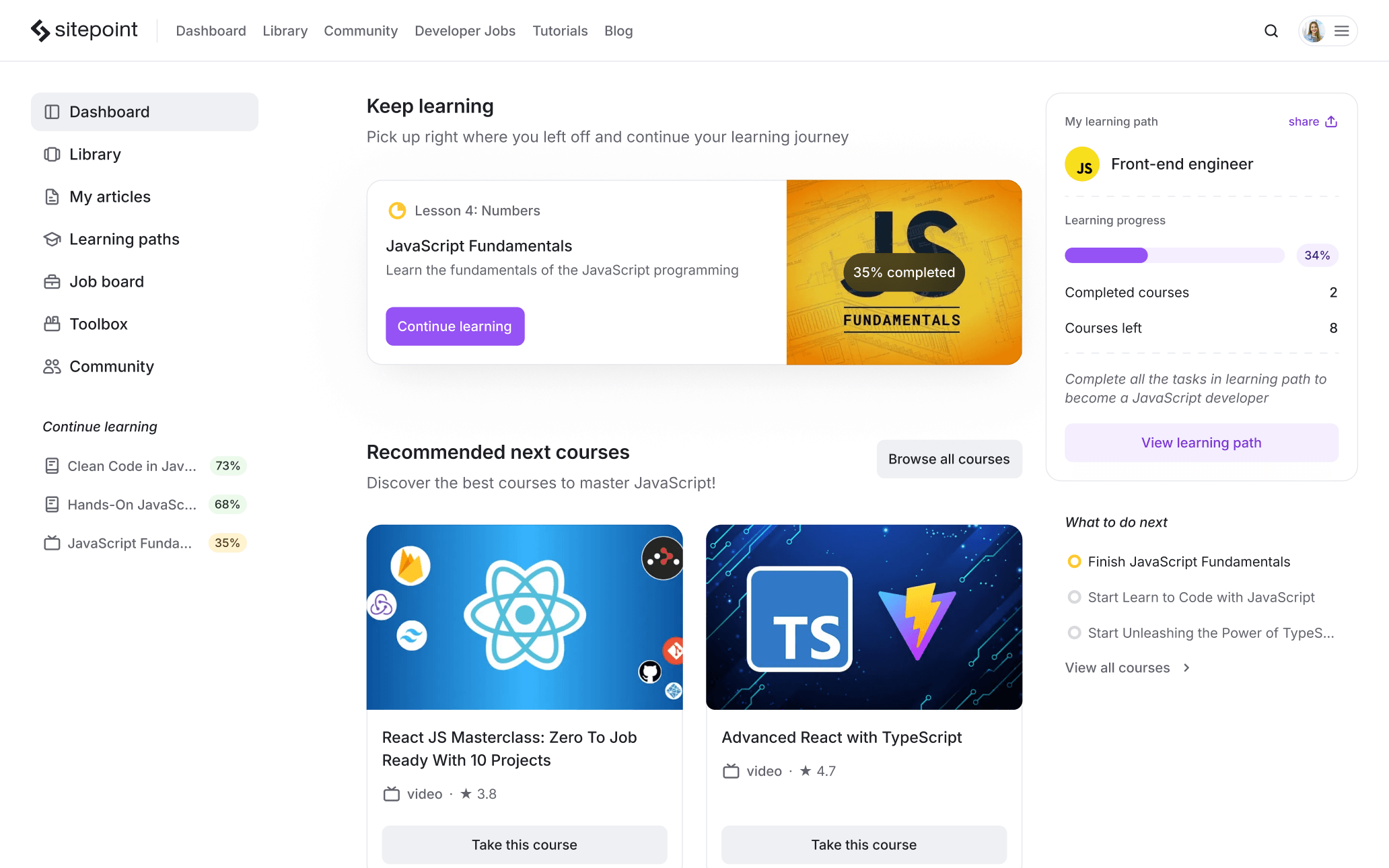Welcome to SitePoint!
Access a huge library of books and courses
On various topics: JavaScript, Python, AI, and more!
Use arrows to navigate
Browse our comprehensive collection of courses, books, and tutorials on a wide range of development and design topics.

video

video
·
★ 5.0
video
·
★ 5.0
video

video

video
·
★ 4.5Browse our comprehensive collection of courses, books, and tutorials on a wide range of topics.
The home for developers



... I joined SitePoint to learn more about web stuff and their PHP/MySQL tutorial was probably the first I used.
Creator of WordPress, CEO of Automattic
Whether you’re a full-stack developer, designer, or looking to get into AI, we’ve got a path for you.

Learn JavaScript, the language of the web. Then deep dive into some popular frontend and backend JavaScript frameworks and start your Full Stack career the right way.

Learn JavaScript, the language of the web. Then deep dive into some popular frontend and backend JavaScript frameworks and start your Full Stack career the right way.

Learn JavaScript, the language of the web. Then deep dive into some popular frontend and backend JavaScript frameworks and start your Full Stack career the right way.

Learn JavaScript, the language of the web. Then deep dive into some popular frontend and backend JavaScript frameworks and start your Full Stack career the right way.

Learn JavaScript, the language of the web. Then deep dive into some popular frontend and backend JavaScript frameworks and start your Full Stack career the right way.

Learn JavaScript, the language of the web. Then deep dive into some popular frontend and backend JavaScript frameworks and start your Full Stack career the right way.
Discover our library filled with learning paths for all kinds of learners.
Browse thousands of jobs in Software Development
20h ago
Senior Software Engineer required by an established technology company located in Staines. Hybrid working - three days per week in the office. The Senior Software Engineer will focus on developing and maintaining SDKs for for four key products spanning JavaScript (TypeScript), Roku (BrightScript), Android (Java) and iOS (Objective-C). The Senior Software Engineer will be the 'code owner' for JavaScript and Roku SDKs. Key Responsibilities Being 'code owner' for JavaScript and Roku SDKs Analysing and defining new requirements Maintaining and improving CI/CD Ensuring feature parity and API alignment between different platforms SDK improvements where possible Helping define software development practices, policies & tooling Key Experience Strong JavaScript knowledge Commercial experience with Java and/or Objective-C Version control and other core software engineering skills Experience in any of the following areas would be advantageous but is not a prerequisite Python or similar scripting language Roku Android and/or iOS React or similar web application framework Node XML/JSON If you are seeking a role of this nature please get in touch for more information. Spectrum IT Recruitment (South) Limited is acting as an Employment Agency in relation to this vacancy.
20h ago
Station Systems Maintenance Technician Level 3 Job Description Every time you pick up the phone, surf the Internet, travel on a motorway, catch a train, bus or tube, or even dial 999; chances are telent have enabled the technology to make this happen. The successful Station Systems Technician Level 3 will be responsible for carrying out planned and corrective maintenance activities on CCTV, CIS, PHP, PAVA, SISS (Station Information and Security Systems). The role is to work Monday to Friday days and cover stations in London down to the South Coast. Station Systems Maintenance Technician, what you’ll do: Attending planned and corrective maintenance tasks Ensuring SISS assets are well maintained, and station communication faults are reported and fixed Utilising field IT equipment to provide real time corrective and planned maintenance data Liaison with Telent Service Centre for tasking, fault updates and completions. Perform daily, weekly, monthly and annual planned maintenance activities as defined by the Team Leader Who you are: You’ll have a previous experience within a similar role or have CCTV, IP knowledge or come from an electrical background and ideally have an understanding of Network Rail health & safety procedures/processes. SISS Maintenance Technician Key requirements: Have experience of CCTV, CIS, PAVA, PHP or come from an electrical background Monitor work progress and handle any issues that arise Good understanding of ServiceNow or using IT for updating/closing jobs/reporting Full UK Driving Licence The job holder will be required to work Monday to Friday days What we offer: A career at Telent can span many sectors, roles, technologies and clients giving you the opportunity to develop, learn new skills and make an impact. We are growing and we rely on our committed Team to deliver. We nurture the talent that makes this happen, by our on-going commitment to creating an inclusive culture that respects and values difference, that celebrates diverse ideas. We want everyone to feel they can be themselves and to thrive at work. The additional benefits with this role: 26 days holiday, plus public holidays, and the option to buy or sell days annually Commercial Vehicle Company pension scheme A range of family friendly policies Occupational health support and wellbeing Portal Discounts on Cinema, Restaurants and Shopping with Telent Reward scheme Learn more about Telent: Click here for Telent Video! We’re passionate about creating an environment that champions diversity and inclusion, where everyone feels they belong, can be themselves and empowered to reach their full potential. People are at the heart of our business, and we believe that our teams should reflect the diverse experiences and backgrounds of the communities we support LI-REMOTE TJ-REMOTE About Us About Telent Telent is a leading technology company and specialist in the design, build, support and maintenance, drawing on decades of experience in mission critical communications and technology. of the UK’s critical digital infrastructure. The work we do helps connect thousands of people and communities, using the best technology and innovation available. When you join us, you’ll have the opportunity to make a real impact on all our futures by fulfilling your potential and delivering high performance. We work together to make everyday life work better for everyone. You’ll be part of a team of more than 3,000 brilliant, dedicated people committed to getting the job done well. Brilliance brought together. We are guided by our values and behaviours: Be Inclusive Take Responsibility Collaborate Be Customer-focussed
Full Time
20h ago
Lead DevOps Engineer AWS, Windows / Linux servers, Kubernetes, Microservices Salary circa £85,000 plus benefits 2 Days per week in the Southampton office plus on call shift once every three weeks. Candidates must be eligible for SC clearance. Lead DevOps Engineer required to join a leading international Software Business committed to delivering high-performance IT solutions. This is a large operation and will be working within the integrated part of the software engineering team with specific focus on facilitating and building automated pipelines for continuous delivery of the team's deliverables. As a Lead DevOps Engineer you will work closely with the DevOps team members in the US and India and form part of a follow-the-sun support escalation model. You will help maintain and contribute to the ongoing reliability, performance and support of the cloud services and infrastructure. This includes monitoring the operating environments, responding to incidents, problems and helping other teams as necessary. This role have been created by team expansion and new client wins. Key Responsibilities: Work on the design, development and release and deployment of cloud based infrastructure, automation and applications Working with and supporting the development team with application configuration for deployment, monitoring and other automation Provide operational management and support of Windows and Linux servers and containers, including server hardening, patching, network security and log management Work with the DevOps Manager and Information Security team members to ensure that infrastructure meets compliance requirements and engineering best practices Mentor other more junior members of the team Provide on / out of hours support on a rota basis Skills Required: 5 years of experience working with AWS 5 years of experience working with Linux and Window Servers 3 years working with Kubernetes, Helm and the related DevOps toolchain in a production environment 3 years' experience using Terraform or similar tools Experience with Bash scripting Ability to conduct detailed code reviews against Helm and IaC If you have the relevant skills for this role and are ready for the challenge, then please send your CV to Spectrum IT Recruitment (South) Limited is acting as an Employment Agency in relation to this vacancy.
20h ago
There is so much opportunity in the world of IT Defence and this large site now have a brand-new position for a Network Solution Architect. As the solution owner for the full lifecycle of a solution from feasibility to delivery you will make sure the solution has continuity from an architectural and design perspective. Come and build and implement end-to-end solution/technical design on this high profile account. You do need to be eligible for DV Clearance for this position. Hybrid fixed with 1 to 2 days on site per week in either Salisbury OR Portsmouth, What you'll be doing: Create and implement end-to-end solution/technical design. Provide solution and technical SME mentorship. Provide a customer concern point for design related issues within projects. Align standards, frameworks and security with overall business and technology strategy. Identify, communicate, and address Information Assurance risks. Design security architecture elements to mitigate risks in liaison with Solution Leads. Create solutions that balance business requirements with information and cyber security requirements. Identify security design gaps in existing and proposed architectures and recommend changes or improvements. What youll bring:. Experience of core Cisco Networking technologies covering switching, routing, firewall, wireless(ASA,ACI,NX-OS,IOS etc.). Good knowledge of network orchestration and automation. Concrete understanding of fundamental vendor independent network (IP) concepts and adjacent technologies (DHCP, DNS etc). Experience leading projects and working as part of a team including preparing and presenting designs to a high standard. Experience with Windows server, AD, exchange SharePoint, group policy. It would be great if you had: Familiarity with industry standard frameworks in project management and architecture (Prince2, TOGAF etc). Cisco Unified Communications, and ideally also Asterisk PABX. Familiar with concepts involved in SEIM and other network security technologies. Knowledge of Endpoint Management. Familiarity with public cloud (M365, AWS, Azure Google). If you are interested in this role but not sure if your skills and experience are exactly what were looking for, please do apply, wed love to hear from you! Employment Type: Permanent Location: Hybrid fixed with 1 to 2 days per week on site in either Salisbury OR Portsmouth, Security Clearance Level: Eligible for DV Clearance Internal Recruiter: Jane Salary: To £75K Benefits: £5,400 car allowance, 25 days annual leave with the option to buy additional days, private medical, life assurance, pension, and generous flexible benefits fund Loved reading about this job and want to know more about us? Sopra Sterias Aerospace, Defence and Security business designs, develops and deploys digital solutions to Central Government clients. The work we do makes a real difference to the clients goal of National Security, and we operate in a unique and privileged environment. We are given time for professional development activities, and we coach and mentor our colleagues, sharing knowledge and learning from each other. We foster a culture in which employees feel valued and supported and have pride in their work for the customer, delivering outstanding rates of customer satisfaction in the UKs most complex safety- and security-critical markets.
20h ago
A Webmethods Developer is required who is a British National and eligible for SC clearance, for an initial 6 month contract. This role is remote with any travel to site fully expensed and is inside IR35 so will require working via an FCSA accredited umbrella company. Essential sills and experience: *Experienced WebMethods developer *Axway API gateway experience. *Experience of technical design, dev and testing support for new integrations across a range of systems. Due to the nature and urgency of this post, candidates holding or who have held high level security clearance in the past are most welcome to apply. Please note successful applicants will be required to be security cleared prior to appointment which can take up to a minimum 10 weeks. LA International is a HMG approved ICT Recruitment and Project Solutions Consultancy, operating globally from the largest single site in the UK as an IT Consultancy or as an Employment Business & Agency depending upon the precise nature of the work, for security cleared jobs or non-clearance vacancies, LA International welcome applications from all sections of the community and from people with diverse experience and backgrounds. Award Winning LA International, winner of the Recruiter Awards for Excellence, Best IT Recruitment Company, Best Public Sector Recruitment Company and overall Gold Award winner, has now secured the most prestigious business award that any business can receive, The Queens Award for Enterprise: International Trade, for the second consecutive period.
20h ago
As a Senior Software Engineer, you'll help shape how we design, build, and deliver software that supports millions of people. Working in agile teams, you'll combine hands-on coding with mentoring and technical leadership, creating robust, scalable systems that stand the test of time. You'll bring strong engineering practices, like test-driven development, and experience with cloud platforms and microservices to a collaborative, supportive environment. Pay up to £78,517, plus 28.9% employer pension contributions, hybrid working with 60% home working, flexible hours, and great work life balance. DWP. Digital with Purpose. DWP is the UK's largest government department. We help people into work, and make payments worth over £195bn a year to support some of the most vulnerable people in our society. We are looking for a Senior Software Engineer to join our community of tech experts in DWP Digital. We're driving a once-in-a-generation transformation of government services. We're using fresh ideas and leading-edge technologies to build and maintain innovative, scalable and user-centric digital solutions that will be used by nearly every person in the UK, at key moments in their lives. The scale of what we do is extraordinary, and our purpose is unique. We'd love you to join us. Delivery. Work. Projects. You'll play a key role in shaping how we build and deliver software that really matters. You'll work as part of an agile team, helping to guide the work while also supporting and mentoring other engineers along the way. You'll bring your solid understanding of JavaScript & Node.JS, software design and architecture to create reliable, scalable systems that are used by millions of people. You'll also take ownership of the code you and your team write, making sure it's robust, well-tested, and built to last. We're big on collaboration, and you'll help foster a team culture where good engineering practices are second nature. That includes things like test-driven development (TDD), which you'll already be confident with and keen to encourage across the wider engineering community. If you've worked with containerised microservices and cloud platforms before, you'll feel right at home. We use well-established deployment patterns, so your experience will help you get up to speed quickly and start making an impact from day one. What skills, knowledge and experience will you need? You'll bring deep expertise in modern JavaScript and Node.js, using well-established frameworks and design principles to lead the delivery of high-quality software. You'll apply Test-Driven Development (TDD) and Behaviour-Driven Development (BDD) techniques to build reliable, maintainable code from the ground up. You'll work with APIs, RESTful services, and microservice architectures, designing and developing systems that are scalable, secure, and easy to maintain. You'll develop in cloud environments like AWS and Azure, using the right tools and services to get the best out of each platform. You'll work confidently with both SQL and NoSQL databases, including Postgres, MySQL, and MongoDB, choosing the right approach for the task at hand. You'll build and maintain robust automated test suites that support continuous deployment and give teams confidence to move fast. You'll lead multidisciplinary engineering teams, helping shape delivery, set standards, and foster a collaborative, supportive culture that brings out the best in everyone. Details. Wages. Perks. You'll join us in one of our brilliant digital hubs in Birmingham, Blackpool, Leeds, Manchester, Newcastle-upon-Tyne and Sheffield, whichever is most convenient for you. We also have all the tools and tech we need to enable our people to work and collaborate flexibly. We work a hybrid model - you'll be in the office about 40% of the time, and 60% home working. We offer competitive pay of up to £78,517. You'll also get a brilliant civil service pension with employer contributions worth over 28.9%, and a generous leave package starting at 26 days. You can also take up to 3 extra days off a month on flexi-time. We have a broad benefits package built around your work-life balance which includes: An award-winning environment and culture: Employer of the Year 2023 (Women In IT Awards), Founders Award for Outstanding Digital Leadership 2023 (Digital 100) Flexible working including flexible hours and family-friendly policies Time off volunteering and charitable giving Bring your authentic self to work with 'I Can Be Me in DWP' Discounts and savings on shopping, fun days out and more Interest-free loans to buy a bike or a season ticket, so it's even easier for you to get to work and start making a difference Sports and social activities Professional development, coaching, mentoring and career progression opportunities. CLICK APPLY for more information and to start your application.
Stay sharp with the latest updates in tech industry!

Published in
··July 3, 2025

Published in
··July 1, 2025

Published in
····June 27, 2025

Published in
··June 27, 2025
Discover a world of insights - browse our complete collection of articles in one place!
emdadulahmed96
197
2 hours ago
2
toolman
14
2 hours ago
2
stephenjlearmonth
24
13 hours ago
4
oliverliam4589
22
a day ago
2
kmcnet
622
a day ago
45
codeispoetry
33
a day ago
2
We Develop Elite Developers
7 Day Free Trial. Cancel Anytime.


